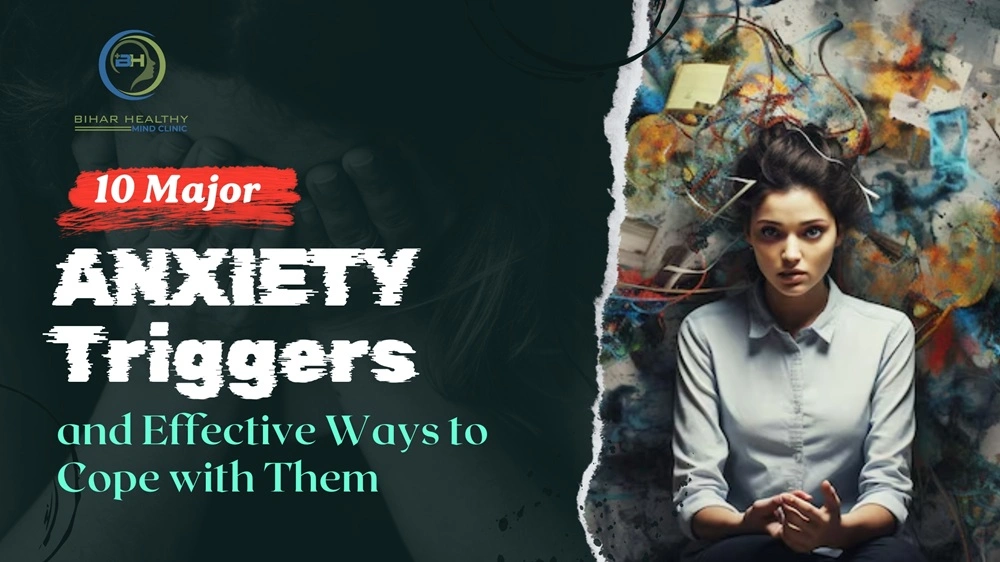
Anxiety is one of the most widespread mental health concerns, affecting millions of people worldwide. While it is normal to feel anxious occasionally, persistent or intense anxiety can interfere with personal, social, and professional life. What often fuels these overwhelming feelings are anxiety triggers - specific events, thoughts, or circumstances that heighten symptoms of worry, fear, or panic.
Learning to identify and manage anxiety triggers is crucial for maintaining good mental health. At Patna Psychiatry, under the guidance of Dr. Saurabh Kumar, MD (Psychiatry), patients are offered structured, evidence-based approaches to anxiety management. Widely recognized as the best psychiatrist in Patna, Dr. Kumar emphasizes that understanding triggers is the first step toward recovery.
This article highlights 10 common anxiety triggers and explores effective coping strategies that can help individuals regain control over their mental well-being.
Top 10 Anxiety Triggers and How to Manage Them
1. Stressful Work or Academic Pressure
Deadlines, long working hours, or academic expectations often act as strong anxiety triggers. Continuous pressure without proper breaks can cause burnout.
How to Cope:
- Break tasks into smaller, manageable steps.
- Use tools like planners or digital reminders.
- Take short breaks to avoid mental fatigue.
- Try relaxation practices such as meditation or progressive muscle relaxation.
2. Financial Struggles
Money worries such as debts, bills, or job instability are among the most common anxiety triggers. These issues often lead to chronic stress.
How to Cope:
- Create a realistic monthly budget.
- Track expenses to reduce unnecessary spending.
- Seek financial counseling if needed.
- Focus on small financial goals instead of overwhelming long-term worries.
3. Relationship Conflicts
Disagreements with a partner, family member, or close friend can impact emotional stability. Relationship stress often triggers feelings of insecurity and anxiety.
How to Cope:
- Practice active listening and open communication.
- Set boundaries to protect emotional well-being.
- Attend relationship or family counseling if conflicts persist.
- Engage in self-care activities like journaling or exercise.
4. Major Life Transitions
Big changes such as moving to a new city, starting a new job, or becoming a parent—can be unsettling and act as anxiety triggers.
Tips for Coping with Transitions:
- Plan ahead to reduce uncertainty.
- Keep a positive but realistic mindset.
- Lean on family and friends for emotional support.
- Remind yourself that adjustment takes time.
5. Social Situations
Social gatherings, interviews, or public speaking can cause intense anxiety for some individuals. The fear of being judged or embarrassed often fuels this trigger.
How to Cope:
- Gradually expose yourself to social situations rather than avoiding them.
- Rehearse before presentations or speeches.
- Practice grounding techniques to calm nerves.
- Consider Cognitive Behavioral Therapy (CBT) for long-term improvement.
6. Health Concerns
Worrying excessively about health, even minor symptoms can escalate into health anxiety. Constantly searching symptoms online can make matters worse.
Key Coping Strategies:
- Rely on medical professionals instead of online forums.
- Schedule regular health check-ups for reassurance.
- Limit unnecessary self-diagnosis.
- Engage in mindfulness to manage overthinking.
7. Traumatic Experiences
Trauma from abuse, accidents, or significant losses can remain as long-term anxiety triggers. Flashbacks or reminders often bring back distressing emotions.
How to Cope:
- Seek trauma-focused therapy or counseling.
- Join support groups for shared healing.
- Practice grounding techniques when triggers arise.
- Rely on psychiatric treatment to process emotions safely.
8. Substance Use or Withdrawal
Excessive caffeine, alcohol, or drugs can worsen anxiety. Likewise, withdrawal from these substances often causes irritability and restlessness.
Coping Recommendations:
- Reduce stimulants like caffeine gradually.
- Avoid alcohol or recreational drugs.
- Replace unhealthy coping habits with exercise, yoga, or balanced nutrition.
- Seek psychiatric help if withdrawal becomes overwhelming.
9. Negative Thinking Patterns
Catastrophic thinking, self-criticism, or "what if" scenarios often create unnecessary worry. These patterns are internal but powerful anxiety triggers.
Ways to Replace Negative Thinking:
- Challenge negative thoughts with logical reasoning.
- Keep a daily journal to monitor thought patterns.
- Replace self-criticism with affirmations.
- Work with a therapist to restructure unhealthy thought cycles.
10. Uncertainty and Lack of Control
Not knowing what the future holds can be deeply unsettling. Global crises, personal uncertainty, or sudden changes often heighten anxiety.
Coping Steps:
- Focus only on things you can control.
- Understand that unpredictability is an inevitable part of living.
- Practice grounding techniques to stay present.
- Use mindfulness or meditation apps for daily balance.
Quick Summary: Key Anxiety Triggers at a Glance
Here’s a checklist of the most common anxiety triggers to watch for:
- Work or study pressure
- Financial worries
- Relationship conflicts
- Major life changes
- Social anxiety
- Health concerns
- Trauma or past experiences
- Substance use or withdrawal
- Negative thinking
- Fear of uncertainty
The Role of Professional Support
Self-help strategies provide temporary relief, but long-term anxiety often requires professional intervention. At Patna Psychiatry, patients benefit from:
- Personalized psychiatric evaluations
- Evidence-based treatments such as CBT and behavioral therapy
- Medication management when necessary
- Stress-management and lifestyle counseling
Under the expertise of Dr. Saurabh Kumar, recognized as the best psychiatrist in Patna, patients receive holistic care designed to reduce symptoms and improve overall mental well-being.
Conclusion
Understanding and identifying anxiety triggers is a powerful step toward better mental health. By recognizing what intensifies anxiety, whether it is financial stress, relationship problems, or negative thoughts, you can adopt practical coping strategies and seek help when needed.
If anxiety affects your daily life, don’t struggle in silence. Reach out to Patna Psychiatry and get expert support from the best psychiatrist in Patna. Professional treatment ensures not only relief from symptoms but also long-term emotional resilience and peace of mind.
Visitors: 73





No comments yet.